The Gone With the Wind controversy and 4 contemporary films that challenge its context
For anyone who thinks that there are no racist movies in the US or that they aren’t a “real” problem, I have compiled a list of movies whose main purpose is far from white supremacy propaganda, and where the African-American minorities don’t play a supporting, dispensable or dangerous role – exceptions that until recently wouldn’t have been possible. With that in mind, let’s get back for a moment to the days when American fiction film has triumphantly emerged with Birth of a Nation (dir. David Wark Griffith, 1915), a racist work (more than 3 hours in length) where, following the Civil War and the abolition of slavery, white, helpless and innocent women would be threatened with rape by some now free African-American brute. For any such act or whenever a white man felt threatened by a black man, white men hung their inferiors on their own estate. This film, which has been highly praised for its aesthetic execution, led to the rise of the Ku Klux Klan three months later. 24 years later, racism stands strong on its feet with the release of another iconic American film, Gone With the Wind (dir. Victor Fleming, after an adaptation of the homonymous novel written by Margaret Mitchell).
Since in recent years, more and more film theorists and critics have been denouncing films made in the past because they propagate harmful ideas or promote filmmakers whose abuses have finally come to light (like Harvey Weinstein), but also as a result of the #BlackLivesMatter protests emerging in the USA after the murder of George Floyd, HBO’s decision to temporarily remove Gone With the Wind, one of the most beloved movies in Romania, from its collection only came as natural. The decision provoked all sorts of reactions – from comical to scandalous – with the final message that we shouldn’t question a film made in the past, which only reflects the social context of the time. This argument can be easily challenged – Gone With the Wind is a propaganda film, without any nuances, where the fight against slavery in the South has an apocalyptic climate, everything collapses in flames; North Americans are seen as savages who burn down the landlords’ properties and then force them into labour just like they did before with the people of colour, a tragedy of social decline and so on.
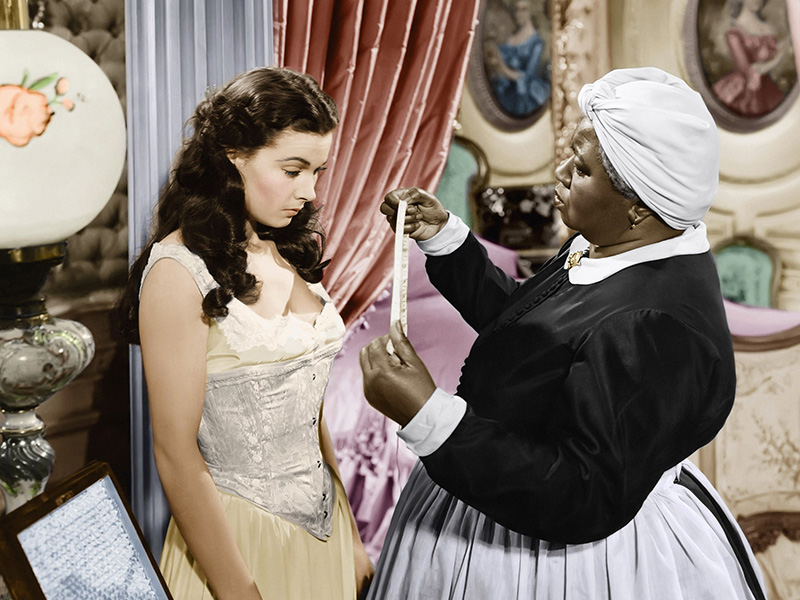
Just a bit of a context: the film takes place in 1861, at the edge of the American Civil War, and although it’s embalmed in a typical love story with a very capricious-but-persistent landlord girl, racist propaganda is postulated in the opening credits prologue, which announces that the viewer is to watch “the last of gallantry and cotton fields, of master and slave, a world that you now find only in books, for it is no more than a dream remembered”. Basically, Gone With the Wind refers to the nostalgia of slavery – the film, released in 1939, doesn’t necessarily see the servants of color on the Tara domain as brutes (although, arguably, they’re only seen as uneducated and noisy, which still remains an odious cliché), but it does conceal the message that once the slaves are no longer there to pick cotton, the estate will disappear in one form or another, cause who else is going to work on it?
More and more materials that critically discuss the issue of racism emerge in the media – from video essays on “whitewashing” and “blackface” (the first concept refers to the casting of white actors instead of minorities, denying the latter the right to play important roles; the second speaks about the fact that in the early days of cinema, white actors painted their faces to play black characters, and later black actors had to paint themselves with even darker black paint, for the amusement of the audience) to fiction films such as Black Panther (dir. Ryan Coogler, 2018), a Marvel utopia with uncolonized superheroes living in Wakanda (a prosperous and independent African metropolis). Without going any further with the introductions, I chose a mini-gallery of films directed by African-American filmmakers, which talk about the experiences of African-Americans, their culture, as well as the desire to integrate / assert themselves in an unfair and faraway society, which reminds you at every step that you are “the Other”.
- 13th – dir. Ava Duvernay, 2016
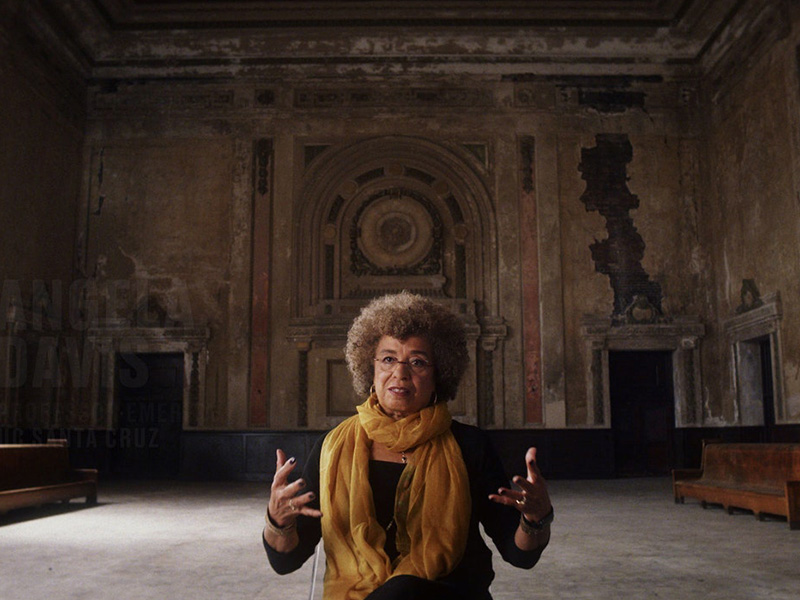
In her documentary, 13th, Ava Duvernay discusses at length the physical implications of the 13th Amendment in the US Constitution, which came into force in 1865; it announces the abolition of slavery and involuntary servitude, unless we are talking about serving a criminal sentence. Basically, by providing evidence and statistics, the film states that, once slavery reached a conceptual end, another type of servitude has been instated in the United States – prisons were filled with people of color who were forced to work for the government without being paid, thus keeping a kind of abominable continuity to slavery. The film also explores several themes and concerns expressed by African-American filmmakers and artists, which debate the incrimination based on color and the social stigma that minorities face to this day (they’re seen from the very beginning as dangerous, drug owners, rapists, beasts, etc. – very Birth of a Nation-like). In 1995, forensic scientist John DiIulio called them “superpredators”, a phrase which even Hillary Clinton paraded with – as to justify the austere measures that increased penalties and time spent in prisons, and the increasingly rampant schism between the majority and minorities. In the end, it’s just a capitalist industry that highly benefits from the people in prison – which is no longer able or even want to give back.
- Get Out – dir. Jordan Peele, 2017
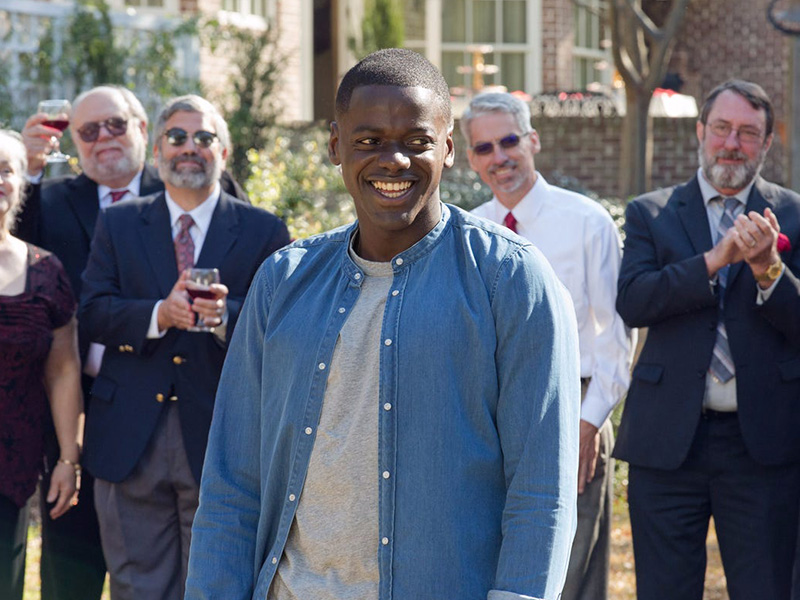
Get Out was a groundbreaking film from several points of view: first, it follows the story of Chris, a black photographer who is about to spend a weekend at the parents of his white girlfriend, Rose, and is quite concerned with many possible issues (are they racists, will they accept him, or is he just paranoid?); second, it builds on a much deeper metaphor of colonialism – the use of the bodies of African-Americans to prolong the life expectancy of upper class elders in the United States (very much like the members of the cult in Being John Malkovich, who take on the body of the American actor). Peele inserts all sorts of racial metaphors throughout the film: the two ran over a deer, as a sort of prediction that the protagonist will be just another victim of Rose (and implicitly of segregation) among dozen of others, and Chris, who encounters so many weird incidents, first suspects the family’s black servants (even him is used to the social norms that first blame minorities for the mishaps). Unlike Us, Jordan Peele’s 2019 film, Get Out is a little more subtle and inventive – if Us is a fatalistic horror about class privilege, the latter has a (almost) happy ending and bits of pure comedy.
- Sorry to Bother You – dir. Boots Riley, 2018
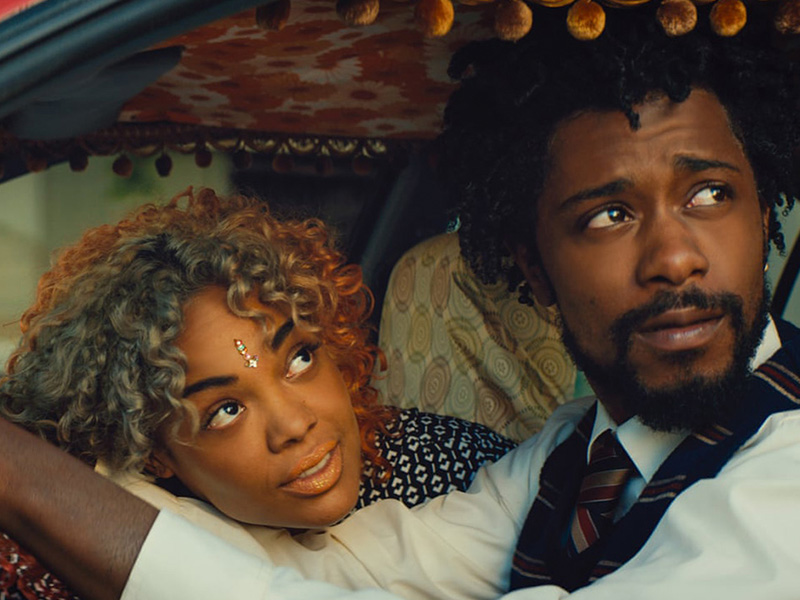
We’re presented with a call center company and Cassius Green (Lakeith Stanfield), an ambitious African-American; once he gets hired by the company, he is willing to do anything for the absolute title of “power user” (a mystical function in the company, which ensures, among other things, climbing to the next floor with an elevator overlaid with gold). And “anything” entitles being selfish and self-sufficient or denying (literally) his natural voice – one of the most comical and satirical scenes in the film is when Green “speaks” like a white man, to sound more convincing to his interlocutors. Of course, as in any political satire, Cassius reaches the top, leaving his left-wing activist girlfriend behind and embracing a corporation that recruits full-time slaves, but, once he gets to the core of the system, he wakes up and starts a revolution.
- BlacKkKlansman – dir. Spike Lee, 2018
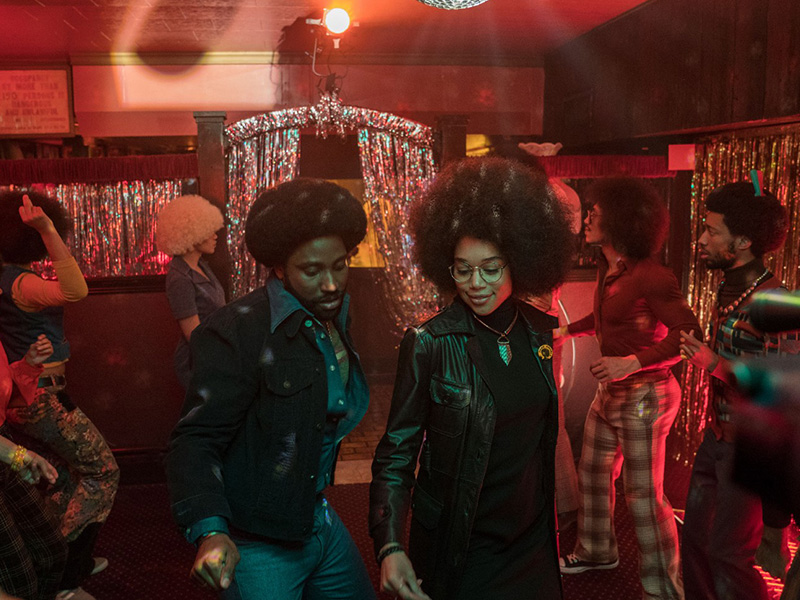
The premise in BlacKkKlansman might sound as astonishing as in Sorry to Bother You if it weren’t for a real life event (based on Ron Stallworth‘s memoirs from 2014): in the 1970s, an African-American cop infiltrated the very heart of the Ku Klux Klan, he’s in contact with their leader and, with the help of his alter-ego, another policeman of Jewish origin, even gets a membership. Although the film is articulated as a social comedy, Spike Lee constantly reminds the viewers that the protagonist, even though he is a police officer, still suffers from racial prejudice (in a scene, for example, he is arrested by his colleagues, although he shouts several times that he is undercover), but since he’s on the other side of the wall, he also ends up committing abuses without realizing it.
Journalist and film critic, with a master's degree in film critics. Collaborates with Scena9, Acoperișul de Sticlă, FILM and FILM Menu magazines. For Films in Frame, she brings the monthly top of films and writes the monthly editorial Panorama, published on a Thursday. In her spare time, she retires in the woods where she pictures other possible lives and flying foxes.


